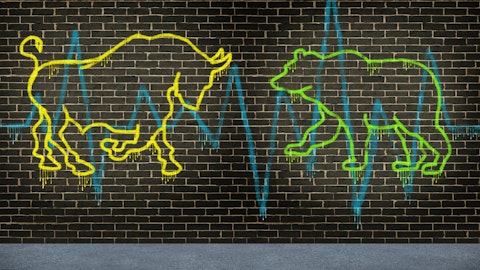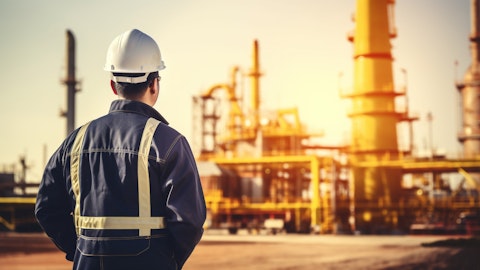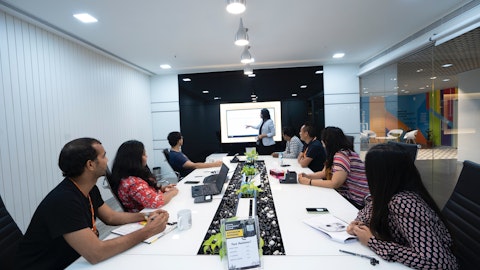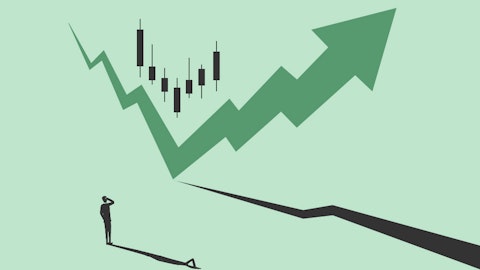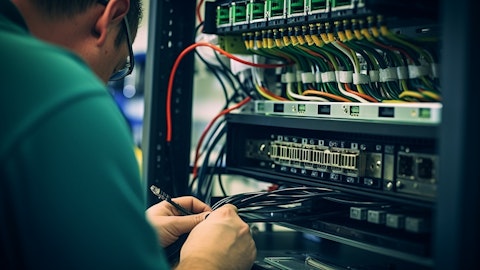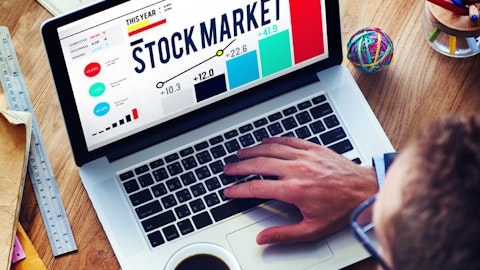Is that the best use or the best ultimate value realization for shareholders? Or is it just throwing it into one pot and having all this cash and marketable securities there? And maybe taking a chance where we can get the holding company discount. In any event, whatever the answer to that question is, it’s going to be harder to grow the cryptocurrency business in the context of something that’s enormous like that. So we have to make a much more radical effort to give it prominence. And we don’t want to make a radical effort for the reasons I mentioned earlier because you have to go in a steady and deliberate pace because there’s always the danger every quarter that your equipment is going to be obsolete. So you can’t commit a lot of money to equipment in any given quarter because you really don’t know what’s happened.
Or put it another way, that’s not been the philosophy, all the other companies have done the same thing. So I leave it to you to see how that policy has worked out. And I don’t think it’s worked out in the interest of shareholders. Just my personal opinion, not trying to cast any aspersions on anyone. It’s just that the pace of technological change is very rapid. We have to be very mindful of it. So we don’t want to be in a position where we’re going to force things in ways we ought not or would not otherwise do. So I hope that explains the logic.
Therese Byars: The next question has a rather long follow-on kind of explanation for why he’s asking. Could management give a bit more detail on what would entice them to make dividend distributions to FRMO shareholders. On the point regarding Mr. Bregman’s comments on stock dividends for investors to create a home-made custom dividend yield opposed to cash dividends from the company, and also relating to the gentleman’s question on FRMO’s valuation near the end of the previous meeting. I’d like to say that, one, I would like to retain as much relative percent interest as possible in the business of FRMO itself for as long as possible. And two, I would like to any gains received from any ownership of the business to be based on the economics of the underlying business rather than the vagaries of Mr. Market and whatever the market price and liquidity happens to be on offer in the market at any given time.
As the gentleman in the previous meeting knows, the valuation of FRMO by Mr. Market does not always make perfect sense. I’d like to repeat the Warren Buffett quote, “I never attempt to make money on the stock market. I buy on the assumption that they could close the market the next day and not reopen it for five years”. From this perspective, I completely understand management’s continued apparent and deep prioritizing of uplifting FRMO. It has nothing to do with the fundamental operations of the business. With a cash dividend, the economics of the business or underlying owned businesses of FRMO can speak for themselves and could in a way, reduce or eliminate the need for any kind of uplifting, rerating or other form of greater recognition from marginal buyers in order to reward existing shareholders.
In this case, rewarding existing shareholders for inching toward becoming ex shareholders. This would also allow existing shareholders who are not directors to continue opportunistically accumulating shares without having to compete with any newer sector of Mr. Market than any road show may gain the attention of them. So the question was at the beginning. So could you give a bit more detail on what would entice management to make dividend distributions to FRMO shareholders?
Murray Stahl: Okay. So the moment I agree with all, by the way, I agree with all the sentiments in the question. So I’m completely in agreement with all that stuff. So we don’t have any plans at FRMO to pay a dividend. I don’t know, uplifting as far as that goes, we’ve just been so busy we just really haven’t had the time. We have been doing a lot of stuff. We have – frankly, we haven’t had a lot of time to even think about. We’re mainly doing in FRMO is we’re building the cryptocurrency business. So towards that end, to the extent we can generate cash, a lot of that is going to be deployed in growing the crypto business. So I think we get a lot more value for shareholders in reinvesting in the crypto business in a gradual sort of way than we’d get if we paid a dividend.
So we’re just going to continue what we’re doing at more or less same pace and we’re going to see what happens. So far, it’s the crypto we have is getting to be pretty considerable. And we keep buying crypto-related assets. So eventually, it’s all going to coalesce and something you’re going to see regular operating earnings from. When the cryptocurrency business is something that’s really much better understood by the public. Right now, I don’t think it’s very well understood by the public. Eventually, people will get it. In the meantime, we’re just going to keep growing it. So I hope that answers the question. We’re not going to do things on the fringes. We’re just going to more or less maintain our policy.
Therese Byars: Yes. Horizon Kinetics recently posted third quarter commentary with a large section of the publications dedicated to the merit of crypto exchanges and their exposure to the derivatives market. How does management reconcile this with their thesis that the whole past 40 years of market dynamics has been an aberration based in large part on rates falling to zero. In the commentary’s own graphics, derivatives growth only seems to start growing after the historically low rates that came after the 2000.com bubble. What might a higher for longer risk-free rate due to various trading costs, behaviors and capital allocation decisions that could negatively affect exchanges?
Murray Stahl: Okay. So let me just take it in parts. The last 40 years, more or less the aberration, let me explain what the aberration was historically. So in the ’80s, we started with some inflation, and we started with high interest rates. And then the miracles happened. First miracle was, the Soviet Union began to collapse towards the end of decade, it collapsed. The significance to that was, Soviet Union didn’t have a lot in the way of technology, but it’s a literal treasure chest. Every conceivable natural resource you can imagine. And just about everything came on the global market, every commodity you can possibly think of. So we had a miracle disinflation, which had not collapsed, wouldn’t have happened. Miracle number 1.
Miracle number 2, the People’s Republic of China. Now People’s Republic of China didn’t have much in the way in natural resources. So they couldn’t rival the Soviet Union. What they did have is, and they do have 1.4 billion, would it be people. And they have a lot of commodities to put in the global market, they put 1.4 billion people on the global market, now is the global labor arbitrage. So all sorts of companies maybe almost every company in the S&P 500 that move production to China. Not just move production in China as big. I don’t want to understate that at all. Not just move production in China and thereby, got higher profit margins. Margins that were unimaginable not the many years previously. But also don’t forget the next miracle, which involves the People’s Republic of China, but also involves other people.
